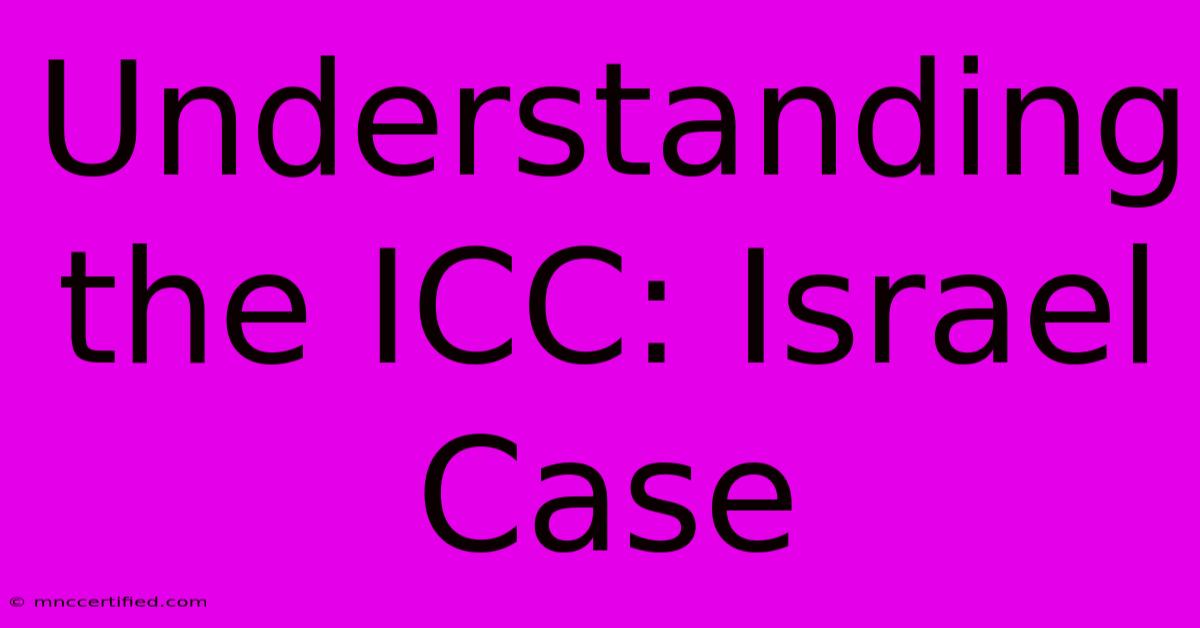Understanding The ICC: Israel Case

Table of Contents
Understanding the ICC: The Israel Case – A Complex Legal Landscape
The International Criminal Court (ICC) and its involvement in the Israeli-Palestinian conflict represent a highly complex and contentious area of international law. This article aims to provide a clear understanding of the ICC's jurisdiction, the specific allegations against Israel, and the ongoing debates surrounding this case.
The ICC's Jurisdiction: A Key Understanding
The ICC is an independent international tribunal established to prosecute individuals accused of the most serious crimes of international concern, namely genocide, crimes against humanity, war crimes, and the crime of aggression. Crucially, the ICC's jurisdiction is not universal. It only applies in specific circumstances:
- States-Party Referrals: A state party to the Rome Statute (the treaty establishing the ICC) can refer a situation to the Court.
- Security Council Referrals: The UN Security Council can refer a situation, even if the implicated state isn't a member of the Rome Statute.
- Prosecutor's Proprio Motu Investigations: The Prosecutor can initiate investigations based on their own assessment of sufficient evidence, but this requires demonstrating that the relevant crimes occurred on the territory of a state party or that a state party's national committed the crimes. This is the mechanism used in the Israeli case.
The ICC Investigation into the Situation in Palestine: Allegations and Challenges
In 2018, the ICC Prosecutor opened an investigation into the situation in Palestine, focusing on alleged crimes committed in the West Bank, including East Jerusalem, and the Gaza Strip since June 13, 2014. This investigation is based on the Prosecutor's finding that Palestine is a "State Party" under the Rome Statute, a claim fiercely contested by Israel and the United States.
Key Allegations against Israel include:
- War Crimes: Allegations primarily focus on actions during military operations in Gaza, including potential violations of the laws of war concerning proportionality and distinction (targeting civilians and civilian infrastructure). The siege of Gaza and the impact on the civilian population also feature prominently.
- Crimes against Humanity: This category involves alleged widespread or systematic attacks against civilians, such as unlawful killings, torture, and persecution.
Challenges to the ICC's Jurisdiction:
Israel, along with the United States, strongly rejects the ICC's jurisdiction over Palestine. Their primary arguments are:
- Palestine's Statehood: They argue that Palestine is not a sovereign state and therefore cannot be subject to the ICC's jurisdiction. This argument hinges on the definition of "state" under international law and the political complexities surrounding Palestine's status.
- Bias and Political Motivation: Accusations of bias against Israel are frequently raised, alleging a lack of impartiality in the ICC’s investigations and prosecutions.
- National Sovereignty: Concerns are raised regarding the encroachment on national sovereignty and the potential for the ICC to be used as a tool for political pressure.
Ongoing Developments and Future Implications
The ICC investigation is ongoing, with the potential for indictments and trials in the future. The outcome of this investigation will have significant implications for international criminal law, the Israeli-Palestinian conflict, and the future role of the ICC. The legal arguments surrounding jurisdiction, the evidence presented, and the political reactions will shape the debate for years to come.
Further Research:
To gain a deeper understanding, consider researching the following:
- The Rome Statute: Read the text itself to fully grasp the ICC's mandate and limitations.
- ICC Prosecutor's reports: Access official documents and statements from the ICC.
- Scholarly articles and legal analyses: Explore academic perspectives on the legal and political aspects of the case.
This case highlights the complex interplay between international law, national sovereignty, and geopolitical realities. Understanding the nuances of the ICC's jurisdiction and the allegations against Israel is crucial for navigating this intricate and ever-evolving situation.

Thank you for visiting our website wich cover about Understanding The ICC: Israel Case. We hope the information provided has been useful to you. Feel free to contact us if you have any questions or need further assistance. See you next time and dont miss to bookmark.
Featured Posts
-
Coral Gables Palace In Uk Documentary
Nov 22, 2024
-
Missiles Fly Russia Responds To Ukraines Long Range Strike
Nov 22, 2024
-
Travel Insurance For Turkey Visa
Nov 22, 2024
-
Princeton Swimmers Vs Penn Cornell
Nov 22, 2024
-
Dental Code For Expose And Bond
Nov 22, 2024